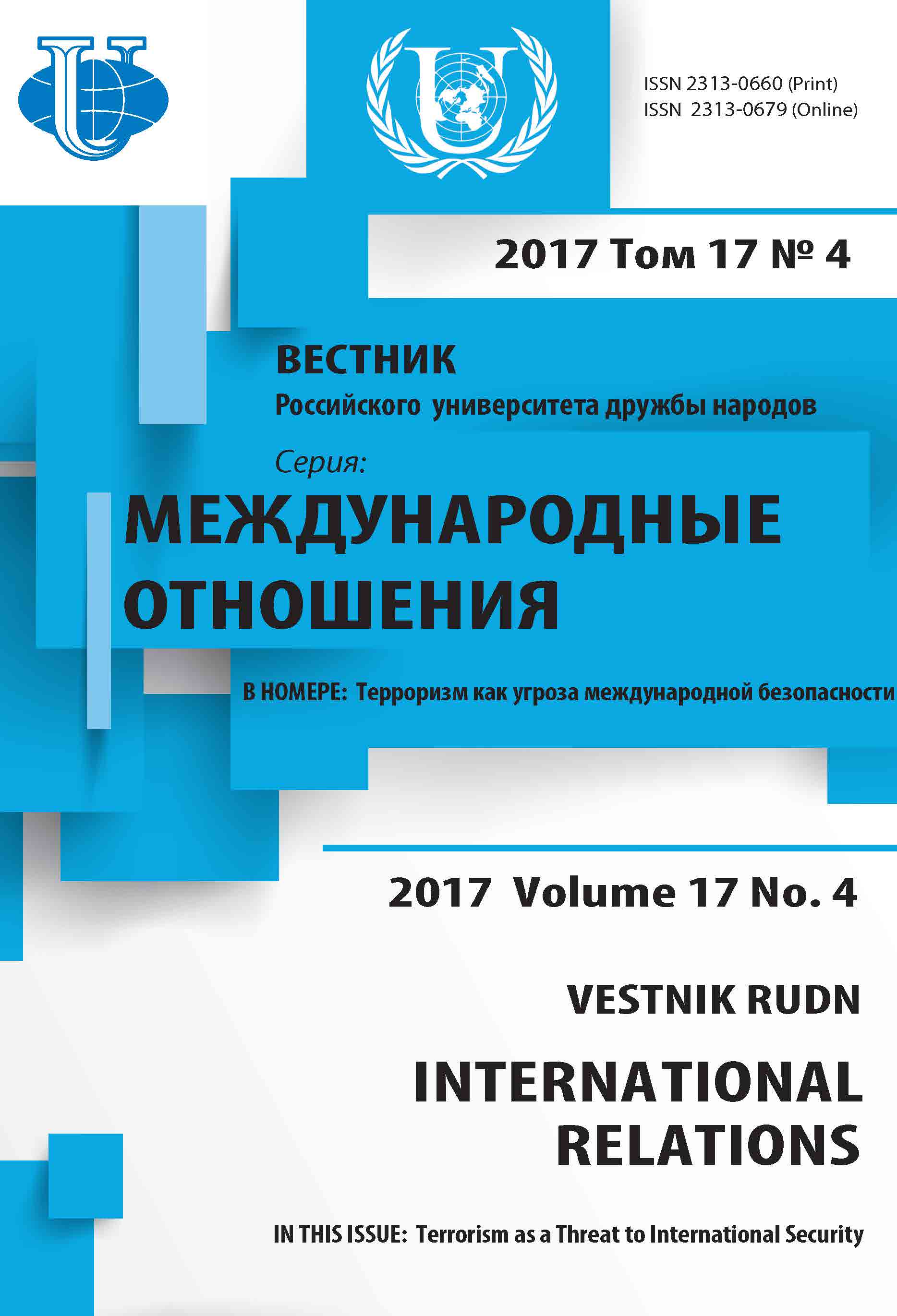GERMAN PARTICIPATION IN THE STRUGGLE WITH THE INTERNATIONAL TERRORISM AT THE TERRITORY OF SOMALIA
- Authors: Trunov P.O1
-
Affiliations:
- Moscow State University in the name of M.V. Lomonosov
- Issue: Vol 17, No 4 (2017): Terrorism as a threat to international security
- Pages: 710-726
- Section: THEMATIC DOSSIER
- URL: https://journals.rudn.ru/international-relations/article/view/17530
- DOI: https://doi.org/10.22363/2313-0660-2017-17-4-710-726
- ID: 17530
Cite item
Full Text
Abstract
Staying Somalia in a state of instability is a serious threat for the security of the international community, including countries and institutions of the West. At the modern period, its key element is the activity of the international terrorist structure Al Shabab. Germany and its EU partners face with the problem of the revitalization of Al Shabab terrorists. The methodological basis of the paper is the theories of armed conflicts resolution and the con-struction of armed forces (at the example of the Somalian national army). The key research methods are the event-analyses and the comparative analyses. The aim of the article is the research of the German approach to resolving the “Somali problem”. In this regard, the first task is to study the previous experience of Germany in counteracting with in-stability in Somalia in the 1990-s and since the late 2000-s. (in the framework of counteracting piracy). The second task, on the solution of which is paid the main attention in the article, is the research of complex usage by Germany of its political, military and economic tools for the weakening of Al Shabab. The article studies German participation in the EU mission for the reform of the security sector of Somali. At this base, the article concludes about the military participation of Germany in the struggle with the international terrorism. The article covers the course, problems and prospects of using the national army of Somalia for fighting against Al-Shabab in the south, as well as separatist currents in the northern part of the country. The paper researches German promotion in restoring the structures of power in the country and the process of federalization as the key direction of the stabilization in Somalia. The article covers the features of German economic participation in the decision of deep internal Somali problems, which mainly led to the appearance and strengthening of the Al Shabab positions. The research paper concludes about the measures, which are needed from Germany for the full de-feat of Al Shabab and future minimization of the terrorist threat from the Horn of Africa states for Ger-many and the EU.
Keywords
About the authors
Ph O Trunov
Moscow State University in the name of M.V. Lomonosov
Author for correspondence.
Email: 1trunov@mail.ru
Trunov Philipp Olegovich - PhD in Political Science, Scientific Researcher of the Department of International Security, the Faculty of World Politics, Moscow State University in the name of M.V. Lomonosov
References
- Baehr, D. (2011). The Somali Shabaab militias and their jihadist networks in the West. KAS international reports, 8, 22—38.
- Bakonyi, J. (2011). Land ohne Staat, Wirtschaft und Gesellschaft im Krieg am Beispiel Somalias. Frankfurt: Campus Verlag.
- Dunaev, A.L. (2011). Somali-2011: Humanitarian catastrophe at the phone of the civil war. MSU Vestnik, Series 25: International Relations and World Politics, 4, 126—146. (In Russ.).
- Hansen, S. J. (2013). Al-Shabaab in Somalia: The History and Ideology of a Militant Islamist Group. Oxford: Oxford University Press.
- Hoehne, M.V. (2011). Al Shabaab in Somalia: Von einer Terrorzelle zu einem regierungsähnlichen Akteur. In: Somalia: Optionen — Chancen — Stolpersteine. Ed. by W. Feichtinger, G. Heinzl. Wien: Böhlau Verlag, p. 121—158.
- Hussein, S. (2015). Al Shabaab in Somalia: between clan and faith. In: Terrorism and Counter- Terrorism in Africa. New York: Springer Nature, p. 39—66.
- Ivanova, L.V. (2013). Al Shabab in Somalia: hope of peace or threat to the world? Asia and Africa today, 12, 23—26. (In Russ.).
- Jones, S. G., Liepman A. M. & Chandler N. (2016). Counterterrorism and Counterinsurgency in Somalia. Assessing the campaign against Al-Shabab. California: Rand Corporation.
- Klute, G. (2013). Tuareg-Aufstand in der Wüste. Ein Beitrag zur Anthropologie des Krieges und der Gewalt. Mit einem Geleitwort von Trutz von Trotha. Köln: Rüdiger Köppe Verlag.
- Konovalov, I. (2008). The Somali’s islamists. Asia and Africa today, 4, 47—52. (In Russ.).
- Kühne, W. (2016). West Africa and the Sahel in the grip of organized crime and international terrorism. Why the UN, EU and Germany should prepare for a long stay. In: Frankreich, Deutschland und die EU in Mali. Chancen, Risiken und Herausforderungen. Ed. by St. Brüne. Baden-Baden: Nomos, Aschendorff Verlag, p. 111—131.
- Lobban, R.A. & Dalton, C. (2017). African insurgencies: from the colonial era to the 21st century. New York: Praeger Security international.
- Mezentsev, S.V. (2014). Internal and international and political aspects of crisis in Mali and French operation “Serval”. MSU Vestnik, Series 25: International Relations and World Politics, 1, 3—28. (In Russ.).
- Pabst, М. (2011). Internationales Krisenmanagement in Somalia. In: Somalia: Optionen — Chancen — Stolpersteine. Ed. by W. Feichtinger, G. Heinzl. Wien: Böhlau Verlag, p. 161—180.
- Popova, O.P. & Trunov, Ph. (2016). The interagency cooperation in the framework of assistance to fragile states: the German experience. MSU Vestnik, Series 25: International Relations and World Politics, 1, 107—139. (In Russ.).
- Reininghaus, Fr. (2011). Operation Atalanta am Horn von Afrika Die erste maritime Operation der Europäischen Union. In: Somalia: Optionen — Chancen — Stolpersteine. Ed. by W. Feichtinger, G. Heinzl. Wien: Böhlau Verlag, p. 205—224.
- Shagalov, V.A. (2011). The civil war in Somalia and peacekeeping operation of the African Union. Scientific Notes of Kazan State University. Series: Humanitarian Sciences, 1, 207—216. (In Russ.).
- Taylor, М. (2013). Review: Al-Shabaab in Somalia: the history and ideology of a militant islamist group, 2005—2012. URL: http://africanarguments.org/2013/04/25/review-al-shabaab-in-somaliathe-history-and-ideology-of-a-militant-islamist-group-2005-2012-by-magnus-taylor/ (accessed: 15.07.2017).
- The Bundeswehr on Operations: Publication to Mark the 15th Anniversary of the First Parliamentary Mandate for Armed Bundeswehr Missions Abroad. (2009). Berlin, Federal Ministry of Defense.
Supplementary files










